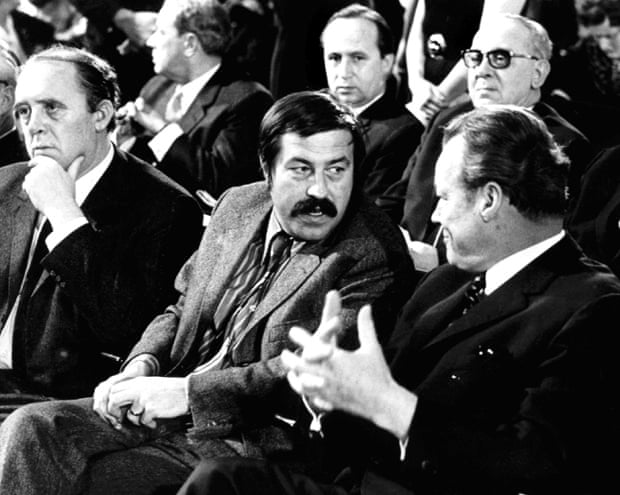Günter Grass: the man who broke the silence
 Günter Grass (centre) with then German chancellor Willy Brandt (right) and his colleague Heinrich Böll (left) during the first congress of the German Writers’ Association in Stuttgart, January 1970. PHOTO/Dick/EPA
Günter Grass (centre) with then German chancellor Willy Brandt (right) and his colleague Heinrich Böll (left) during the first congress of the German Writers’ Association in Stuttgart, January 1970. PHOTO/Dick/EPA
Truth-teller, controversialist, affectionate friend – above all, ingenious and inspirational novelist … Orhan Pamuk, John Irving and other writers salute Günter Grass, who died this week
Rachel Seiffert
Günter Grass was a name I knew long before I read him. His volumes lived on my parents’ bookshelves, the somewhat po-faced flounder on the dust jacket of Der Butt (The Flounder) an unsettling but nonetheless compelling call to open the covers. Grass was an artist as well as a writer, and famously designed his own book jackets. The image he created for Der Butt – a dark line-drawing, a fish depicted whispering into a listening ear – is redolent of secrets, of unease.
He established himself from the first as an exposer of Third Reich shame and secrets, The Tin Drum dismantling the failures of his parents’ generation with a shrewd and deft storyteller’s irony. Bold and very funny, often grotesquely so, the following two volumes of his Danzig trilogy confirmed him as the moral compass for a generation of postwar German leftwingers. Over his career he became a thorn in the side not just of conservatives, but ideologues of all kinds.
By the 1970s, his books were publishing events, with enormous first print runs, advance copies in the thousands and reading tours that pulled in significant audiences. His modus operandi, like Oskar, his drumming protagonist, was to make a big noise. He sought to do this, increasingly, through controversy, enraging feminists with the amoral philandering anti-hero of Der Butt, for example. More recently, in 2012, he got himself banned from Israel over a poem about Iran.
The Tin Drum remains a model of excellence: a book to find solace in for its wit and sharp-eyed characterisation. Anna Bronski, the drumming Oskar’s grandmother, is one of world literature’s great supporting characters, and I frequently use extracts of her depiction when running seminars on the writer’s craft. He also spoke out against the reunification process. In that brief and turbulent time after the fall of the Berlin Wall, but before the two Germanys were joined again, many in the east debated the idea of remaining a separate state, even of having another go at socialism, without the Wall and the Stasi. However unrealistic this seems with hindsight, or when seen from the outside, for countless East Germans, the pace and presumption of reunification were an affront. Grass’s approach to this was typically intemperate: he compared the process to Hitler’s annexation of Austria. By then, he seemed always to have half an eye on his reputation.
But his books mattered; in his heyday, there was a sense that literary fiction should and did matter. He wasn’t alone: Heinrich Böll, his fellow German Nobel laureate, also took Third Reich guilt and postwar silences as his themes, and Walter Kempowski, whose Echolot and final novel are now available in English translation, used dry wit to underscore his countrymen’s hypocrisies. Grass, however, was arguably the key public literary figure of that generation; his work essential reading for the German book-buying public, whether they approved of him or not. My Hamburg grandmother fell into the latter category, but she insisted my cultural education – one of those stiffly German notions, which Grass so delighted in thumbing his nose at – would be incomplete without his stories.
With his revelation, late in life, of his teenage Waffen-SS membership, Grass became the story; the secret he kept back, almost to the last, making his life’s narrative seem more tightly – and more conventionally – plotted than any of his fiction. It was distasteful, given the moral status he’d so long enjoyed and exploited, and perhaps especially given that it came out as part of the advance publicity for his memoirs. For many, this was the last straw: who could take him seriously any more?
The revelation has figured prominently in every obituary and article I’ve read this week, and rightly so but for the pall it casts over the brilliance of Grass’s early work. This does the writing, if not the man, an injustice; it might even be missing the point. Grass was a phenomenon: a man of so many parts. Artist, sculptor, journalist, speechwriter. Acid-penned novelist, derider of silences, pricker of postwar consciences and complacent West German bubbles. Attention-seeker, celebrity author and political animal. It was salutary, and bitingly ironic, to discover him to be also (as the Germans say) stinknormal, stinkingly normal. His wartime record reads like that of any number of other German teenage boys at the time. Tarred, in the end, with the same brush he wielded, and with the same historical brush as his nation, Grass led an exemplary – in both senses – 20th-century German life.
The Guardian for more